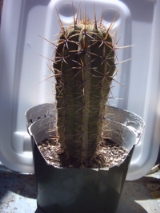
Echinopsis macrogona
Encyclopedia
Echinopsis macrogona or Trichocereus macrogonus
There are 60 known species of Trichocereus, many of which contain psychoactive alkaloids such as mescaline. Trichocereus Macrogonus, a close cousin to the San Pedro, Peruvian Torch and Trichocereus bridgesii, is a blue-green Trichocereus. They are very hardy and easy to grow. It contains less than 1% of 3,4-dimethoxyphenylethylamine, less than 1% of 3-methoxytyramine
, less than 1% of tyramine
and more than 0.05% of mescaline
. Tricocereus macrogonus "Big Mac" is the fastest growning of all the Tricos. Growing so fast that 2 feet per year is common, sometimes splitting their own skin. Most consider Trichocereus macrogonus and Trichocereus peruvianus to be one and the same (T. macrogonus = T. peruvianus).
There are 60 known species of Trichocereus, many of which contain psychoactive alkaloids such as mescaline. Trichocereus Macrogonus, a close cousin to the San Pedro, Peruvian Torch and Trichocereus bridgesii, is a blue-green Trichocereus. They are very hardy and easy to grow. It contains less than 1% of 3,4-dimethoxyphenylethylamine, less than 1% of 3-methoxytyramine
3-Methoxytyramine
3-Methoxytyramine , also known as 3-methoxy-4-hydroxyphenethylamine, is a metabolite of the neurotransmitter dopamine formed by the introduction of a methyl group to dopamine by the enzyme catechol-O-methyl transferase...
, less than 1% of tyramine
Tyramine
Tyramine is a naturally occurring monoamine compound and trace amine derived from the amino acid tyrosine. Tyramine acts as a catecholamine releasing agent...
and more than 0.05% of mescaline
Mescaline
Mescaline or 3,4,5-trimethoxyphenethylamine is a naturally occurring psychedelic alkaloid of the phenethylamine class used mainly as an entheogen....
. Tricocereus macrogonus "Big Mac" is the fastest growning of all the Tricos. Growing so fast that 2 feet per year is common, sometimes splitting their own skin. Most consider Trichocereus macrogonus and Trichocereus peruvianus to be one and the same (T. macrogonus = T. peruvianus).

